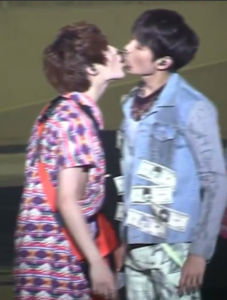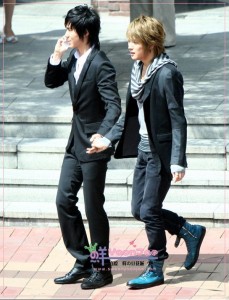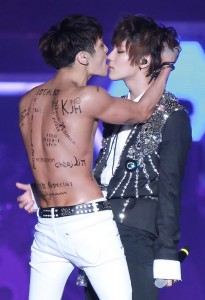We here at Seoulbeats generally do not shy away from tackling the more controversial issues in K-pop, and we have in the past written extensively on both homosexuality in K-pop and the hypocritical nature of celebrities who simultaneously trumpet the anti-gay cause, yet engage in what could undoubtedly be deemed decidedly homosexual fanservice at the same time (lookin’ at Siwon, you handsome bigot, you). One would think that there is no use in beating a dead horse into the ground, and I would be the first to agree — but then I saw these pictures from SHINee‘s World Concert II.
Perhaps it would be more appropriate to headdesk said horse into the ground? Is that possible?
So let me try to get this straight: in an effort to please fans, whose fan culture is dominated by the incredibly bizarre concept of shipping, whereby fans pair two idols together in what is generally interpreted to be a romantic relationship that, depending on which fan fiction you are reading, is eroticized to a pornographic degree, Jonghyun decided (whilst scantily clad) to grab Taemin by the hair, press against him, and imitate landing on him a kiss so sexy and passionate that it might as well have come straight out of an adult move intended for a homosexual audience. And then, not wanting to miss out on more fun, Taemin decided to pass a dollar bill to Minho by way of his mouth, ostensibly to please more fans who maybe weren’t satisfied with the Jonghyun/Taemin kiss because that’s not what they consider their One True Pairing (OTP).
Where do I even begin?
 Shipping in general is not a debate into which I hope to enter at this juncture, because I am in no way qualified to talk about where it began, how it began, and how pervasively disturbing its role in the K-popiverse is. However, what I can tell you is that it is undoubtedly at the root of this incredibly bizarre and bizarrely disturbing display of fanservice — and while I am usually content to sigh through my nose and brush fanservice off as nothing more than just pandering to the masses, the social implications of this particular instance have made me thoroughly disgusted. Why? Because the open acceptance — and indeed, encouragement — of this sort of homoerotic fanservice flies in the face of South Korea’s general attitude towards the homosexual community.
Shipping in general is not a debate into which I hope to enter at this juncture, because I am in no way qualified to talk about where it began, how it began, and how pervasively disturbing its role in the K-popiverse is. However, what I can tell you is that it is undoubtedly at the root of this incredibly bizarre and bizarrely disturbing display of fanservice — and while I am usually content to sigh through my nose and brush fanservice off as nothing more than just pandering to the masses, the social implications of this particular instance have made me thoroughly disgusted. Why? Because the open acceptance — and indeed, encouragement — of this sort of homoerotic fanservice flies in the face of South Korea’s general attitude towards the homosexual community.
I probably don’t need to state that societally, South Korea is (officially) more conservative when it comes to issues of…well, let’s call it sexual liberation. Abortion is still illegal (though not unobtainable), sexual education in public schools could probably use a serious face-lift, and homosexuality is so far underground that it has, by this point, probably made friends with a whole slew of dead horses that we writers have beat there. Forget the issue of homosexual marriage; South Korea has yet to carve out a niche for homosexuals to even exist openly and comfortably in society as human beings deserving of rights and respect. The Korean gay community lives life in secrecy, restricting their activities to the far more forgiving realm of the internet; coming out to parents, relatives, and friends is often a totally unimaginable scenario. Even the Korean gay pride parade is an event that seems anything but prideful; totally absent are the flamboyant colors, costumes, and displays of solidarity and strength that are present at gay pride parades held in the United States and elsewhere. Instead, the event is somber and sobering — all participants wear masks to hide their identities and armbands that state that they are not permitted to be photographed or interviewed by the media. In order to derail suspicions from friends and co-workers, gays and lesbians even enter into what are known as “contract marriages” with each other and maintain the facade of heterosexuality while pursuing homosexual relationships on the side. In South Korea, being gay is often synonymous with living life in fear of being discovered, outed, and ruined.
Even Korean entertainment is subject to the same level of discrimination. Just a few weeks ago, my fellow writer Paloma wrote about the unfortunate case of gay celebrity Hong Seok-cheon, whose coming out out of the closet essentially destroyed his entire career. While he has been able to make small inroads back into entertainment, he has undoubtedly been stigmatized and will likely never fully recover from it. Wisely, he has pursued other business ventures outside of the celebrity world. But the reason behind Hong’s fall from grace? He wasn’t pretending to be homosexual for the sake of anyone else. He lives this life every single day — not simply because fans find it sexy and/or cute when their favorite idols, be the male or female, act as though they are in a romantic and/or sexual relationship. He is gay, and for him, it is not fanservice to be turned into fan fiction. For him and for many other gays, the mere idea of Jonghyun and Taemin doing this as some sort of fanservice joke — and getting away with it — must be completely insulting.
 Let’s imagine for a second that Jonghyun and Taemin weren’t faking it — that they were actually involved in a homosexual relationship, and attempting to make out with each other was their way of telling the world that they are gay and proud of it. I don’t doubt for one second that this sort of coming out would lead to the end of SHINee (and their careers as celebrities in South Korea) faster than you can say, “SHINee’s back.” But let’s consider the fact that this was almost definitely not the case. What does that leave us with? Are we expected to be under the delusion that homosexuality is only okay in South Korea when it serves to fulfill the somewhat inappropriate fantasies of a largely female fan base?
Let’s imagine for a second that Jonghyun and Taemin weren’t faking it — that they were actually involved in a homosexual relationship, and attempting to make out with each other was their way of telling the world that they are gay and proud of it. I don’t doubt for one second that this sort of coming out would lead to the end of SHINee (and their careers as celebrities in South Korea) faster than you can say, “SHINee’s back.” But let’s consider the fact that this was almost definitely not the case. What does that leave us with? Are we expected to be under the delusion that homosexuality is only okay in South Korea when it serves to fulfill the somewhat inappropriate fantasies of a largely female fan base?
Face it: what we have here is the glorification of imagined homosexuality for the perverse pleasure of fans — and this in and of itself is utterly disgraceful and insulting to the millions of men and women in South Korea and around the world who suffer discrimination and oppression simply because they are gay. That this sort of fanservice is deemed “steamy” and said to “make fans go wild” is wrong on so many levels, particularly because if two gay men who truly loved each other kissed that way on the streets of Seoul, they would be shunned for it. Homosexuality is not a joke, not a gag, and certainly not something to be treated as an innocent and light-hearted tool for winning the hearts of fans whose true opinions on homosexuality likely do not apply to their beloved oppas and unnies, however disturbing that may be. To trivialize it to such an absurd degree is disappointing, degrading, and just plain not okay.
What do you say, Seoulmates?
(SM Entertainment, Twitter, Ask a Korean!, John Cho, “The Wedding Banquet Revisited: ‘Contract Marriages’ Between Gays and Lesbians,” Anthropological Quarterly, Vol. 82, No. 2 (2009))


